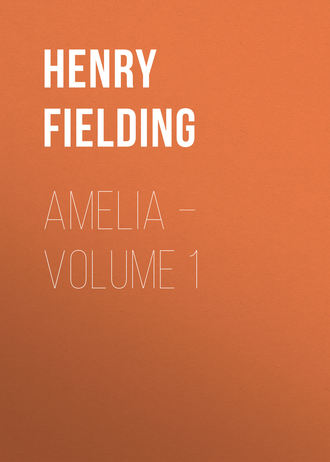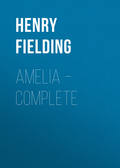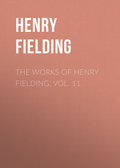
Генри Филдинг
Amelia – Volume 1
BOOK III
Chapter i.
In which Mr. Booth resumes his story
"If I am not mistaken, madam," continued Booth, "I was just going to acquaint you with the doctor's opinion when we were interrupted by the keeper.
"The doctor, having heard counsel on both sides, that is to say, Mrs. Harris for my staying, and Miss Betty for my going, at last delivered his own sentiments. As for Amelia, she sat silent, drowned in her tears; nor was I myself in a much better situation.
"'As the commissions are not signed,' said the doctor, 'I think you may be said to remain in your former regiment; and therefore I think you ought to go on this expedition; your duty to your king and country, whose bread you have eaten, requires it; and this is a duty of too high a nature to admit the least deficiency. Regard to your character, likewise, requires you to go; for the world, which might justly blame your staying at home if the case was even fairly stated, will not deal so honestly by you: you must expect to have every circumstance against you heightened, and most of what makes for your defence omitted; and thus you will be stigmatized as a coward without any palliation. As the malicious disposition of mankind is too well known, and the cruel pleasure which they take in destroying the reputations of others, the use we are to make of this knowledge is to afford no handle to reproach; for, bad as the world is, it seldom falls on any man who hath not given some slight cause for censure, though this, perhaps, is often aggravated ten thousand-fold; and, when we blame the malice of the aggravation we ought not to forget our own imprudence in giving the occasion. Remember, my boy, your honour is at stake; and you know how nice the honour of a soldier is in these cases. This is a treasure which he must be your enemy, indeed, who would attempt to rob you of. Therefore, you ought to consider every one as your enemy who, by desiring you to stay, would rob you of your honour.'
"'Do you hear that, sister?' cries Miss Betty. – 'Yes, I do hear it' answered Amelia, with more spirit than I ever saw her exert before, and would preserve his honour at the expense of my life. 'I will preserve it if it should be at that expense; and since it is Dr Harrison's opinion that he ought to go, I give my consent. Go, my dear husband,' cried she, falling upon her knees: 'may every angel of heaven guard and preserve you!' – I cannot repeat her words without being affected," said he, wiping his eyes, "the excellence of that woman no words can paint: Miss Matthews, she hath every perfection in human nature.
"I will not tire you with the repetition of any more that past on that occasion, nor with the quarrel that ensued between Mrs. Harris and the doctor; for the old lady could not submit to my leaving her daughter in her present condition. She fell severely on the army, and cursed the day in which her daughter was married to a soldier, not sparing the doctor for having had some share in the match. I will omit, likewise, the tender scene which past between Amelia and myself previous to my departure." "Indeed, I beg you would not," cries Miss Matthews; "nothing delights me more than scenes of tenderness. I should be glad to know, if possible, every syllable which was uttered on both sides."
"I will indulge you then," cries Booth, "as far as is in my power. Indeed, I believe I am able to recollect much the greatest part; for the impression is never to be effaced from my memory."
He then proceeded as Miss Matthews desired; but, lest all our readers should not be of her opinion, we will, according to our usual custom, endeavour to accommodate ourselves to every taste, and shall, therefore, place this scene in a chapter by itself, which we desire all our readers who do not love, or who, perhaps, do not know the pleasure of tenderness, to pass over; since they may do this without any prejudice to the thread of the narrative.
Chapter ii.
Containing a scene of the tender kind
"The doctor, madam," continued Booth, "spent his evening at Mrs. Harris's house, where I sat with him whilst he smoaked his pillow pipe, as his phrase is. Amelia was retired about half an hour to her chamber before I went to her. At my entrance I found her on her knees, a posture in which I never disturbed her. In a few minutes she arose, came to me, and embracing me, said she had been praying for resolution to support the cruellest moment she had ever undergone or could possibly undergo. I reminded her how much more bitter a farewel would be on a death-bed, when we never could meet, in this world at least, again. I then endeavoured to lessen all those objects which alarmed her most, and particularly the danger I was to encounter, upon which head I seemed a little to comfort her; but the probable length of my absence and the certain length of my voyage were circumstances which no oratory of mine could even palliate. 'O heavens!' said she, bursting into tears, 'can I bear to think that hundreds, thousands for aught I know, of miles or leagues, that lands and seas are between us? What is the prospect from that mount in our garden where I have sat so many happy hours with my Billy? what is the distance between that and the farthest hill which we see from thence compared to the distance which will be between us? You cannot wonder at this idea; you must remember, my Billy, at this place, this very thought came formerly into my foreboding mind. I then begged you to leave the army. Why would you not comply? – did I not tell you then that the smallest cottage we could survey from the mount would be, with you, a paradise to me? it would be so still – why can't my Billy think so? am I so much his superior in love? where is the dishonour, Billy? or, if there be any, will it reach our ears in our little hut? are glory and fame, and not his Amelia, the happiness of my husband? go then, purchase them at my expence. You will pay a few sighs, perhaps a few tears, at parting, and then new scenes will drive away the thoughts of poor Amelia from your bosom; but what assistance shall I have in my affliction? not that any change of scene could drive you one moment from my remembrance; yet here every object I behold will place your loved idea in the liveliest manner before my eyes. This is the bed in which you have reposed; that is the chair on which you sat. Upon these boards you have stood. These books you have read to me. Can I walk among our beds of flowers without viewing your favourites, nay, those which you have planted with your own hands? can I see one beauty from our beloved mount which you have not pointed out to me?' – Thus she went on, the woman, madam, you see, still prevailing." – "Since you mention it," says Miss Matthews, with a smile, "I own the same observation occurred to me. It is too natural to us to consider ourselves only, Mr. Booth." – "You shall hear," he cried. "At last the thoughts of her present condition suggested themselves. – ' But if,' said she, 'my situation, even in health, will be so intolerable, how shall I, in the danger and agonies of childbirth, support your absence?' – Here she stopt, and, looking on me with all the tenderness imaginable, cried out, 'And am I then such a wretch to wish for your presence at such a season? ought I not to rejoice that you are out of the hearing of my cries or the knowledge of my pains? if I die, will you not have escaped the horrors of a parting ten thousand times more dreadful than this? Go, go, my Billy; the very circumstance which made me most dread your departure hath perfectly reconciled me to it. I perceive clearly now that I was only wishing to support my own weakness with your strength, and to relieve my own pains at the price of yours. Believe me, my love, I am ashamed of myself.' – I caught her in my arms with raptures not to be exprest in words, called her my heroine; sure none ever better deserved that name; after which we remained for some time speechless, and locked in each other's embraces." —
"I am convinced," said Miss Matthews, with a sigh, "there are moments in life worth purchasing with worlds."
"At length the fatal morning came. I endeavoured to hide every pang of my heart, and to wear the utmost gaiety in my countenance. Amelia acted the same part. In these assumed characters we met the family at breakfast; at their breakfast, I mean, for we were both full already. The doctor had spent above an hour that morning in discourse with Mrs. Harris, and had, in some measure, reconciled her to my departure. He now made use of every art to relieve the poor distressed Amelia; not by inveighing against the folly of grief, or by seriously advising her not to grieve; both of which were sufficiently performed by Miss Betty. The doctor, on the contrary, had recourse to every means which might cast a veil over the idea of grief, and raise comfortable images in my angel's mind. He endeavoured to lessen the supposed length of my absence by discoursing on matters which were more distant in time. He said he intended next year to rebuild a part of his parsonage-house. 'And you, captain,' says he, 'shall lay the corner-stone, I promise you:' with many other instances of the like nature, which produced, I believe, some good effect on us both.
"Amelia spoke but little; indeed, more tears than words dropt from her; however, she seemed resolved to bear her affliction with resignation. But when the dreadful news arrived that the horses were ready, and I, having taken my leave of all the rest, at last approached her, she was unable to support the conflict with nature any longer, and, clinging round my neck, she cried, 'Farewel, farewel for ever; for I shall never, never see you more.' At which words the blood entirely forsook her lovely cheeks, and she became a lifeless corpse in my arms.
"Amelia continued so long motionless, that the doctor, as well as Mrs. Harris, began to be under the most terrible apprehensions; so they informed me afterwards, for at that time I was incapable of making any observation. I had indeed very little more use of my senses than the dear creature whom I supported. At length, however, we were all delivered from our fears; and life again visited the loveliest mansion that human nature ever afforded it.
"I had been, and yet was, so terrified with what had happened, and Amelia continued yet so weak and ill, that I determined, whatever might be the consequence, not to leave her that day; which resolution she was no sooner acquainted with than she fell on her knees, crying, 'Good Heaven! I thank thee for this reprieve at least. Oh! that every hour of my future life could be crammed into this dear day!'
"Our good friend the doctor remained with us. He said he had intended to visit a family in some affliction; 'but I don't know,' says he, 'why I should ride a dozen miles after affliction, when we have enough here.'" Of all mankind the doctor is the best of comforters. As his excessive good-nature makes him take vast delight in the office, so his great penetration into the human mind, joined to his great experience, renders him the most wonderful proficient in it; and he so well knows when to soothe, when to reason, and when to ridicule, that he never applies any of those arts improperly, which is almost universally the case with the physicians of the mind, and which it requires very great judgment and dexterity to avoid.
"The doctor principally applied himself to ridiculing the dangers of the siege, in which he succeeded so well, that he sometimes forced a smile even into the face of Amelia. But what most comforted her were the arguments he used to convince her of the probability of my speedy if not immediate return. He said the general opinion was that the place would be taken before our arrival there; in which case we should have nothing more to do than to make the best of our way home again.
"Amelia was so lulled by these arts that she passed the day much better than I expected. Though the doctor could not make pride strong enough to conquer love, yet he exalted the former to make some stand against the latter; insomuch that my poor Amelia, I believe, more than once flattered herself, to speak the language of the, world, that her reason had gained an entire victory over her passion; till love brought up a reinforcement, if I may use that term, of tender ideas, and bore down all before him.
"In the evening the doctor and I passed another half-hour together, when he proposed to me to endeavour to leave Amelia asleep in the morning, and promised me to be at hand when she awaked, and to support her with all the assistance in his power. He added that nothing was more foolish than for friends to take leave of each other. 'It is true, indeed,' says he, 'in the common acquaintance and friendship of the world, this is a very harmless ceremony; but between two persons who really love each other the church of Rome never invented a penance half so severe as this which we absurdly impose on ourselves'
"I greatly approved the doctor's proposal; thanked him, and promised, if possible, to put it in execution. He then shook me by the hand, and heartily wished me well, saying, in his blunt way, 'Well, boy, I hope to see thee crowned with laurels at thy return; one comfort I have at least, that stone walls and a sea will prevent thee from running away.'
"When I had left the doctor I repaired to my Amelia, whom I found in her chamber, employed in a very different manner from what she had been the preceding night; she was busy in packing up some trinkets in a casket, which she desired me to carry with me. This casket was her own work, and she had just fastened it as I came to her.
"Her eyes very plainly discovered what had passed while she was engaged in her work: however, her countenance was now serene, and she spoke, at least, with some chearfulness. But after some time, 'You must take care of this casket, Billy,' said she. 'You must, indeed, Billy – for – ' here passion almost choaked her, till a flood of tears gave her relief, and then she proceeded – 'For I shall be the happiest woman that ever was born when I see it again.' I told her, with the blessing of God, that day would soon come. 'Soon!' answered she. 'No, Billy, not soon: a week is an age; – but yet the happy day may come. It shall, it must, it will! Yes, Billy, we shall meet never to part again, even in this world, I hope.' Pardon my weakness, Miss Matthews, but upon my soul I cannot help it," cried he, wiping his eyes. "Well, I wonder at your patience, and I will try it no longer. Amelia, tired out with so long a struggle between variety of passions, and having not closed her eyes during three successive nights, towards the morning fell into a profound sleep. In which sleep I left her, and, having drest myself with all the expedition imaginable, singing, whistling, hurrying, attempting by every method to banish thought, I mounted my horse, which I had over-night ordered to be ready, and galloped away from that house where all my treasure was deposited.
"Thus, madam, I have, in obedience to your commands, run through a scene which, if it hath been tiresome to you, you must yet acquit me of having obtruded upon you. This I am convinced of, that no one is capable of tasting such a scene who hath not a heart full of tenderness, and perhaps not even then, unless he hath been in the same situation."
Chapter iii.
In which Mr. Booth sets forward on his journey
"Well, madam, we have now taken our leave of Amelia. I rode a full mile before I once suffered myself to look back; but now being come to the top of a little hill, the last spot I knew which could give me a prospect of Mrs. Harris's house, my resolution failed: I stopped and cast my eyes backward. Shall I tell you what I felt at that instant? I do assure you I am not able. So many tender ideas crowded at once into my mind, that, if I may use the expression, they almost dissolved my heart. And now, madam, the most unfortunate accident came first into my head. This was, that I had in the hurry and confusion left the dear casket behind me. The thought of going back at first suggested itself; but the consequences of that were too apparent. I therefore resolved to send my man, and in the meantime to ride on softly on my road. He immediately executed my orders, and after some time, feeding my eyes with that delicious and yet heartfelt prospect, I at last turned my horse to descend the hill, and proceeded about a hundred yards, when, considering with myself that I should lose no time by a second indulgence, I again turned back, and once more feasted my sight with the same painful pleasure till my man returned, bringing me the casket, and an account that Amelia still continued in the sweet sleep I left her. I now suddenly turned my horse for the last time, and with the utmost resolution pursued my journey.
"I perceived my man at his return – But before I mention anything of him it may be proper, madam, to acquaint you who he was. He was the foster-brother of my Amelia. This young fellow had taken it into his head to go into the army; and he was desirous to serve under my command. The doctor consented to discharge him; his mother at last yielded to his importunities, and I was very easily prevailed on to list one of the handsomest young fellows in England.
"You will easily believe I had some little partiality to one whose milk Amelia had sucked; but, as he had never seen the regiment, I had no opportunity to shew him any great mark of favour. Indeed he waited on me as my servant; and I treated him with all the tenderness which can be used to one in that station.
"When I was about to change into the horse-guards the poor fellow began to droop, fearing that he should no longer be in the same corps with me, though certainly that would not have been the case. However, he had never mentioned one word of his dissatisfaction. He is indeed a fellow of a noble spirit; but when he heard that I was to remain where I was, and that we were to go to Gibraltar together, he fell into transports of joy little short of madness. In short, the poor fellow had imbibed a very strong affection for me; though this was what I knew nothing of till long after.
"When he returned to me then, as I was saying, with the casket, I observed his eyes all over blubbered with tears. I rebuked him a little too rashly on this occasion. 'Heyday!' says I, 'what is the meaning of this? I hope I have not a milk-sop with me. If I thought you would shew such a face to the enemy I would leave you behind.' – 'Your honour need not fear that,' answered he; 'I shall find nobody there that I shall love well enough to make me cry.' I was highly pleased with this answer, in which I thought I could discover both sense and spirit. I then asked him what had occasioned those tears since he had left me (for he had no sign of any at that time), and whether he had seen his mother at Mrs. Harris's? He answered in the negative, and begged that I would ask him no more questions; adding that he was not very apt to cry, and he hoped he should never give me such another opportunity of blaming him. I mention this only as an instance of his affection towards me; for I never could account for those tears any otherwise than by placing them to the account of that distress in which he left me at that time. We travelled full forty miles that day without baiting, when, arriving at the inn where I intended to rest that night, I retired immediately to my chamber, with my dear Amelia's casket, the opening of which was the nicest repast, and to which every other hunger gave way.
"It is impossible to mention to you all the little matters with which Amelia had furnished this casket. It contained medicines of all kinds, which her mother, who was the Lady Bountiful of that country, had supplied her with. The most valuable of all to me was a lock of her dear hair, which I have from that time to this worn in my bosom. What would I have then given for a little picture of my dear angel, which she had lost from her chamber about a month before! and which we had the highest reason in the world to imagine her sister had taken away; for the suspicion lay only between her and Amelia's maid, who was of all creatures the honestest, and whom her mistress had often trusted with things of much greater value; for the picture, which was set in gold, and had two or three little diamonds round it, was worth about twelve guineas only; whereas Amelia left jewels in her care of much greater value."
"Sure," cries Miss Matthews, "she could not be such a paultry pilferer."
"Not on account of the gold or the jewels," cries Booth. "We imputed it to mere spite, with which, I assure you, she abounds; and she knew that, next to Amelia herself, there was nothing which I valued so much as this little picture; for such a resemblance did it bear of the original, that Hogarth himself did never, I believe, draw a stronger likeness. Spite, therefore, was the only motive to this cruel depredation; and indeed her behaviour on the occasion sufficiently convinced us both of the justice of our suspicion, though we neither of us durst accuse her; and she herself had the assurance to insist very strongly (though she could not prevail) with Amelia to turn away her innocent maid, saying, she would not live in the house with a thief."
Miss Matthews now discharged some curses on Miss Betty, not much worth repeating, and then Mr. Booth proceeded in his relation.







